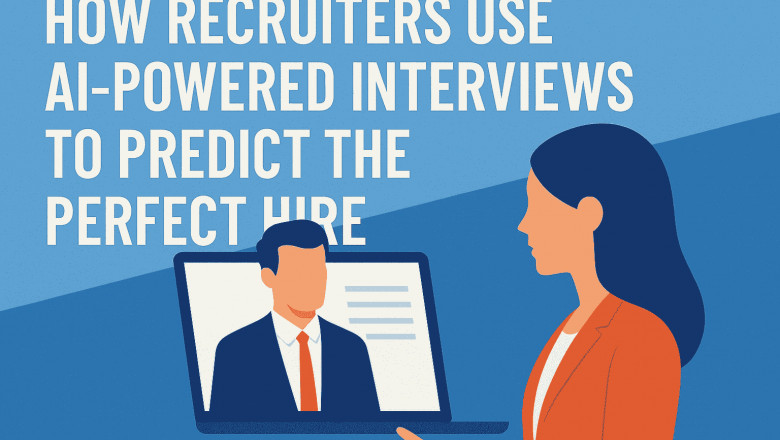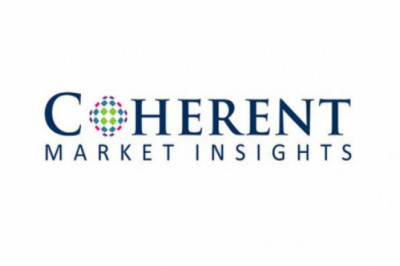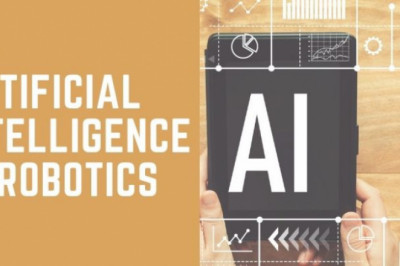views

In the world of hiring, instinct and experience have long ruled the recruiter’s toolkit. A sharp resume, a firm handshake, and a confident answer to "Tell me about yourself" could seal the deal. But the hiring game is evolving and fast.
Today, recruiters have access to powerful digital allies capable of analyzing more than just a resume or a gut feeling. Artificial Intelligence (AI) is changing the way organizations screen, evaluate, and ultimately hire top talent. And at the heart of this transformation are AI-powered interviews a game-changing approach that’s helping recruiters predict not just who looks good on paper, but who will thrive on the job.
Let’s explore how recruiters are using these tools to identify the perfect hire faster, smarter, and with greater accuracy than ever before.
What Are AI-Powered Interviews?
Before diving into how recruiters use them, it’s important to understand what AI-powered interviews are.
These are structured interviews often asynchronous video interviews or chat-based interactions where a candidate’s responses are recorded and analyzed using AI algorithms. These tools evaluate everything from speech patterns, word choices, and eye movements to personality traits and emotional tone.
Rather than relying solely on human interpretation, AI offers data-driven insights that help recruiters make better-informed decisions about a candidate’s potential fit.
The Recruiter’s New Superpower: Data-Backed Decision Making
Recruiters have a challenging job. They must:
- Review hundreds (sometimes thousands) of applications
- Shortlist candidates quickly
- Match skills with job requirements
- Predict cultural fit and long-term potential
AI helps by acting as an intelligent filter. Instead of spending hours manually screening candidates, recruiters can use AI tools to:
- Automatically score responses
- Flag high-potential candidates
- Spot patterns in successful past hires
- Eliminate unconscious bias from the initial screening
This saves time, enhances consistency, and gives recruiters more room to focus on relationship-building and strategic decisions.
How Do AI Interviews Predict Hiring Success?
1. Behavioral Analysis
AI tools assess behavioral traits using psychometric models. For example, if a company needs someone detail-oriented and analytical, the AI looks for linguistic markers and behavioral cues associated with those qualities in the candidate’s responses.
2. Natural Language Processing (NLP)
Using NLP, AI can analyze how a candidate communicates, not just what they say, but how they say it. Recruiters receive insights such as:
- Confidence level
- Communication clarity
- Emotional tone
- Use of action-oriented language
3. Facial and Voice Analysis
Advanced platforms can detect micro-expressions, voice modulation, and facial cues to evaluate emotional intelligence, enthusiasm, and sincerity. These insights help recruiters assess beyond surface-level impressions.
4. Comparative Scoring Models
AI often compares candidates against a database of successful hires in similar roles. This helps predict which candidates are most likely to thrive based on historical success patterns.
Where AI Helps the Most in the Hiring Process
AI-powered interviews are especially helpful during:
- High-volume application periods
- Roles with specific behavioral requirements
- Time-sensitive hiring scenarios
- Situations requiring objective evaluation
Recruiters also leverage AI insights to:
- Tailor final interview questions
- Address concerns during reference checks
- Support final hiring decisions with data
Benefits for Recruiters and Organizations
Recruiters using AI tools report multiple benefits:
- Time Efficiency: Screen hundreds of candidates in hours, not days
- Bias Reduction: Evaluate based on merit, not personal identifiers
- Consistency: All candidates are judged by the same standards
- Improved Quality of Hire: Behavioral insights support better decisions
- Scalability: Easily applied across different roles and regions
Challenges and Ethical Considerations
With great power comes great responsibility. Recruiters must ensure that AI systems are:
- Transparent: Candidates should know how they’re being assessed
- Fair: Tools should be regularly tested for bias
- Complementary: AI should enhance not replace human judgment
Leading companies now incorporate AI ethics into hiring policies to maintain accountability.
How Candidates Are Adapting
Candidates are also evolving to meet this new norm. Recruiters advise applicants to:
- Practice structured and clear responses
- Avoid sounding overly scripted
- Be authentic and tell compelling stories
- Prepare just as they would for a traditional interview
This shift is prompting deeper, more thoughtful preparation something recruiters truly value.
The Human Touch Still Matters
Despite all the technological innovation, the best recruiters know that hiring is still a deeply human process. AI helps with precision, but people still bring intuition, empathy, and cultural awareness to the table.
Recruiters use AI to narrow the field, remove blind spots, and surface hidden gems. But when it comes to final decisions, human connection still plays a critical role.
Conclusion: A New Era of Smarter Hiring
The job market is evolving. Expectations are rising. And the need to hire the right person fast and fairly has never been greater.
That’s why AI-powered interviews are more than just a tech trend they’re becoming a recruitment necessity. Recruiters who embrace this shift are doing more than filling vacancies they’re predicting potential, improving candidate experiences, and building better teams.
In a world where every hire counts, smart tools and smart recruiters make all the difference.












